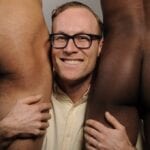the gripping APTN TV series Moccasin Flats broke new ground as the first entirely aboriginal-produced Canadian drama, and fans can look forward to catching the third season on Showcase this summer. One of the most rivetting characters on the show is Amanda Strongeagle (Andrea Menard), a lesbian cop who is caught between the red tape and racism of the Regina police department and a distrustful but desperate aboriginal community hungry for justice, resources and healing.
“We knew that we needed to have a balance, or a contradiction, of street life and police life — that’s the reality in North Central Regina,” says creator, executive producer and actress Jennifer Podemski. “How do you become a police officer or someone who is a keeper of justice who is aboriginal and how do you work within your community? Is it possible?”
The Toronto-based Podemski, 32, says it was important “to show that you can be a strong woman and still make mistakes. [Amanda] was a perfect character in that she had something about her that made her more of an outcast to people. She’s half-native, which sets you up for ostracism from the get-go; she’s a cop, which is worse than anything; she’s gay, which nobody wants to talk about and nobody wants to deal with; and basically she’s got this past that she?s not willing to face herself.”
The third season starts with Amanda distraught over the end of her relationship with her lover Deb (played by Podemski, herself), and their attempts to just be friends. Meanwhile the relationship between Matthew (Mathew Strongeagle) and Tara (Jennifer’s sister Sarah Podemski) hits some road bumps when they start up as music producers. The primary plotline, however, follows the struggle of former sex worker and street outreach activist Candy (Candace Fox) to bring down the pimp who is exploiting a fresh group of young girls; she takes the law into her own hands when she tires of the authorities’ inability to take swift action.
While the show deals with intense and gritty material, from substance abuse to youth prostitution and suicide, the drama is always very believable because the show is about characters and their stories and not about checking off social issues from a list — heart and humour also help greatly.
“As we started to develop the series there were so many issues we wanted to explore, but not explore as issues but explore as stories from a unique perspective,” says Podemski. “With a young woman exprostitute who has HIV trying to get her life together, working back with the community, it’s not so much that we’re focussing on the HIV but the fact that she’s a functioning person in society living with HIV — those were important stories for us.”
Moccasin Flats manages to capture all of the complexities and contradictions, the pain and the joys, or as the series’ website states, “the brutality and the beauty” of life in an aboriginal urban neighbourhood. The third season builds to an explosive dramatic climax before finally honouring the careworn community with a hopeful and transformative finale.
Over the course of the eight half-hour episodes, Amanda is forced to deal with the consequences of her cheating on Deb and accept that she cannot win her back overnight. Amanda is very tough; not being able to have the relationship she wants with Deb throws her for a loop — and into the arms of handsome Jimmy Bighorse (Michael Leisen). We also find out about her fraught relationship with her parents — her seething, estranged mother and her late father, a cop, whom she idolizes.
For Podemski, having queer characters was just a given. “We just knew we wanted Strongeagle to be gay. There’s a lot of kids, native kids especially, people who are ashamed of who they are, whatever it [may be]. Growing up feeling ashamed is really no way to grow up. We wanted to take specific things, like a strong, powerful, successful woman who happens to be gay and has functioning and dysfunctional relationships, just like anybody else — but to make it normal so that someone watching would say, ‘Oh, so it?s not a big deal? I don’t have to kill myself because nobody accepts me?’ You hear a lot of those stories especially in our community. [Sexual orientation] is something that is so rarely talked about.”
The series began life as a training program for both rural and urban aboriginal youth, where they were partnered with mentors from the film industry. “We would empower the youth to basically write stories and we would teach them how to tell their story in a half-hour short film and we would produce it and do the whole thing together. Moccasin Flats was one of the training programs that we did in North Central Regina.”
When you hear dialogue such as, “You probably are the sexiest woman in Regina,” you realize how unsparing its commitment to the city is. This regionalism is not only heartening but fresh. “We really wanted to stay true to the essence, the vibe, the energy, the realism [of the actual neighbourhood]. Our mandate was to give back to the community by supplying jobs. And to work right in the community was incredible. There is nothing that can compare to that. This is as much their show as it is our show.
“We tried to do things that would just break through the pain, break through the shame. So all of that stuff had to be truthful, had to happen in Regina.”


 Why you can trust Xtra
Why you can trust Xtra


